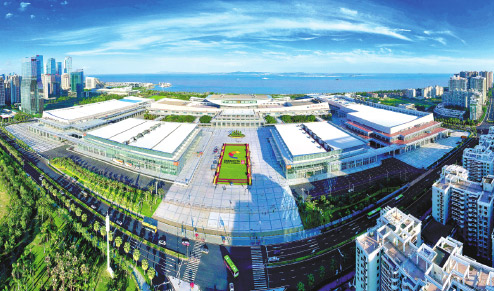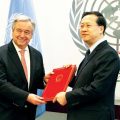
Trade, investment, economic cooperation all key issues this year amid sluggish growth worldwide, Li You reports.
The 2017 BRICS Business Forum will kick off in Xiamen, a resort city in Fujian province, on Sept 3 and 4 during the 2017 BRICS Xiamen Summit, promoting dialogue as well as trade and economic cooperation among BRICS countries.
The acronym BRICS comprises Brazil, Russia, India, China and South Africa. The forum will spark in-depth discussion on topics such as trade and investment, financial cooperation and development, connectivity, the ‘blue economy’ and regional economic growth.
It is organized by the China Council for the Promotion of International Trade, a national-level organization responsible for foreign trade and investment promotion.
More than 1,000 leaders and representatives from BRICS and other countries’ business communities have been invited to the forum, making it a major event during the BRICS Xiamen Summit.
The key theme of this year’s BRICS Xiamen Summit will be BRICS: Stronger Partnership for a Brighter Future, which is made up of two concepts. One of the concepts is focused on building up a wider range of partnerships under the BRICS framework on the global stage, said Zhang Yansheng, deputy director of the expert committee of the China Council for the Promotion of International Trade.
“The second concept concerns how to generate a brighter future in the current economic environment. As we can see, there are two main streams of future perspective.
“One holds the opinion that the world is becoming more open and safe. The cooperative spirit has been evident in more and more situations, which has greatly benefited the BRICS economies, among others,” Zhang said.
But economists are also frequently discussing the uncertainty facing the global economy. The issues of financial trade and investment protectionism, populism, isolationism and unilateralism still exist, Zhang said.
“In 2017, the global economy has showed clear signs of stable development. At the same time, we should notice the uncertainty that could change our international environment and economic layout,” Zhang said.
Zhang made the remarks at a news conference held by the State Council Information Office, to elaborate on the opportunities and challenges facing BRICS economies on Aug 28.
Since 2008, the world has experienced a sluggish economy. International trade and investment have entered a period of low growth.
How to boost international trade and investment and promote the steady growth of the world economy has become a common concern among BRICS leaders, according to the China Council for the Promotion of International Trade.
Against this background, the 2017 BRICS Business Forum will explore solutions for improving global trade and investment, service industry trade, e-commerce and intellectual property.
The aim is to promote the construction of a bigger and more coordinated market among the BRICS countries and to reduce protectionism in trade and investment.
The first BRIC Foreign Ministers’ Meeting was held in 2006 with Brazil, Russia, India and China, on the margins of the general debate of the 61st session of the United Nations General Assembly, marking the prelude for BRIC cooperation.
In 2009, the first BRIC Summit was held in Yekaterinburg, Russia. Since then, the summit has become an annual event.
In the past 10 years, the proportion of global GDP generated by BRICS countries has increased from 12 percent to 23 percent, while the proportion of foreign trade linked to those countries rose from 11 percent to 16 percent, according to Zhang.
In 2016, up to 16 percent of total global foreign investment was attracted to BRICS countries, and they have contributed more than 50 percent of world economic growth, according to Zhang.
“Comparing the growth in trade and investment with the GDP of the BRICS countries, we can conclude that the growth of trade and investment was not as fast as GDP, which means there is still great potential for the growth of trade and investment in those countries,” said Zhang Yanping, member of the expert committee of the China Council for the Promotion of International Trade.
“From China’s perspective, our production cooperation with Latin American countries and South Africa and Russia are now making rapid progress. Chinese enterprises such as Huawei, Xiaomi and Midea have also begun to invest in India,” Zhang Yanping said. Besides trade and investment, financial cooperation is also a major topic under discussion.
The forum will discuss how to further strengthen mutual business exchanges, explore ways to promote financial circulation, and avoid financial risks.
As BRICS countries have long coastlines, the development of the maritime industry has a bright future.
This year’s forum will discuss the maritime industry, by allowing members to share their experience and new technologies related to the protection and sustainable use of maritime resources and transportation, marine science and technology, and recycling models, to achieve the sustainable development of the blue economy. In addition, the forum will discuss how to promote dialogue among the BRICS governments, facilitate investment in infrastructure and cooperation in private capital, and deepen business ties.


